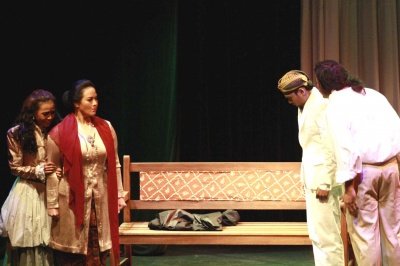
Faiza Mardzoeki’s adaptation of Pramoedya Ananta Toer’s Bumi Manusia (This Earth of Mankind), staged at Amsterdam’s Tropen Theater last month, shed the spotlight on a situation many tend to forget, which is as relevant today as in previous centuries.
Unlike the original version where Minke, the Javanese student educated at the exclusive Dutch-language school and of royal Javanese birth, plays the main protagonist, Faiza’s Call Me Nyai Ontosoroh lets the woman (Nyai) take the lead and tell her story.
Mardzoeki’s adaptation of the play was a short version of the three-hour original performed in 2007 by nine different directors in nine different Indonesian cities. This shorter version, titled They Call me Nyai Ontosoroh, was commissioned by the Tropen Theater.
Written and produced by Faiza Mardzoeki, and directed by Wawan Sofwan, the play uses flash back techniques with video art by Ariani Darmawan and Yudith, two experienced film and video artists.
The music was directed by Riki Setiawan, and Deden Bulqini was responsible for the stage design. The cast comprised Sita Nursanti as Nyai Ontososroh, Agni Melati as Annelies, Willem Bevers as Meneer Herman Mellema, and Bagus Setiawan as Minke.
Performed last month in Amsterdam, the play starts at a point when the original story almost ends.
While opening her old suitcase, the one that she brought with her when she was sold to the Dutch man Mellema — and which would be used again by her daughter who is about to leave her for Holland, Nyai reminisces about her life.
Her memories first take her back to the time she entered Mellema’s house as an uneducated young girl chosen to be the white man’s concubine. She remembers the process of “assimilation” she underwent, in which she acquired knowledge, learned how to speak Dutch fluently, became well versed in literature, and gradually turned into a woman of means and authority, until she ultimately succumbed to the sad reality that she was just a nyai (concubine) without any rights, not even those of a mother.

As known from previous adaptations staged in Jakarta, this play is about the fate of a Javanese girl sold by her father to a Dutch man, to become his concubine. Her master, the manager and shared owner of the farm that she helped develop, educated her. They had two children, a son and a daughter, who were lawfully acknowledged as children of the Dutch man.
Nyai Ontosoroh, however, remained non-existent in the eyes of the law. So when her master’s son — from his wife in Holland — came to scold his father for having left his mother and for his relationship with a “native”, Nyai’s life took a turn for the worst.
Her husband stopped defending her, only visited home sporadically and eventually died. Meanwhile her daughter Annelies fell in love with and married Minke, a Javanese who joined the ranks of those fighting against the Dutch. When Nyai’s husband Mellema was no longer around, his Dutch son demanded custody of Annelies.
And so it happened, that in spite of the impressive speech Nyai Ontosoroh delivered in court to keep her daughter, the Javanese concubine’s right as a mother were dismissed by the court. Her daughter Annelies left for Holland, taking with her the mother’s suitcase filled with the burden of the past. Nyai defended her right, in vain.
Although the story follows the lives of four characters — Nyai Ontosoroh who evolves from helpless girl to a strong woman undeterred by Dutch authorities, her master Mellema who initially teaches her everything to make her a “lady”, their daughter Annelies who has nothing of her mother’s strength but falls in love with Minke, the Javanese Dutch-educated aristocrat who turns against the Dutch with his sharp writings, Nyai Ontosoroh’s character clearly dominates all the scenes. This is Faiza’s way of imparting her view about women’s role in society.
Yet, the acting and timbre of Nyai’s voice did not convey the character’s strength, let alone evoke a thrill. In general, the roles appeared well studied, but only Willem Bevers gave a convincing portrayal of his character Mellema.

Nevertheless, They Call Me Nyai Ontosoroh is a reminder that repression stimulates reaction, and that women, or minorities for that matter, can’t be silenced forever. Faiza Mardzoeki deserves credit for having taken a local story to tackle this big issue, and for succeeding in bringing the performance to Amsterdam, The Hague and Antwerp.
Faiza, 36, who was born into a family of 10 children, soon discovered her status as a girl vis-à-vis that of her brothers. Working in a garment factory was even more of an eye opener, as she experienced the abysmal working conditions female workers were subjected to.
Faiza has been a longtime activist, an active member of the NGO Solidaritas Perempuan (Women’s Solidarity) and co-founder of the Ungu Institute, which promotes the empowerment of women through cultural activities. Although she has always loved going to the theatre to watch plays, she only recently started writing scripts. Last April, she staged an adaptation of Ibsen in Aceh.
They Call Me Nyai Ontosoroh was staged in Amsterdam’s Tropen Theater on May 20 and 21, at the Tong Tong Festival in The Hague on May 23 and 24, and in Antwerp on May 25.
— Photos courtesy of Eva Fitrina
